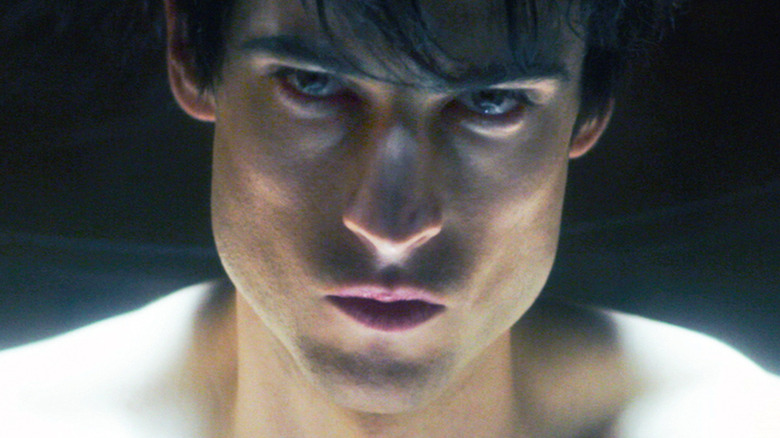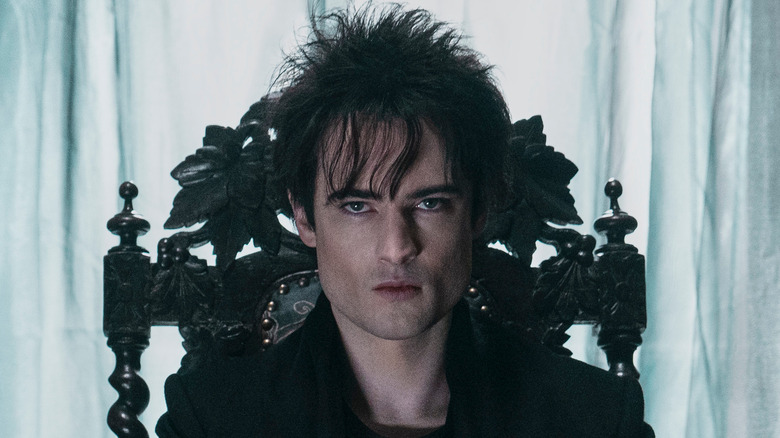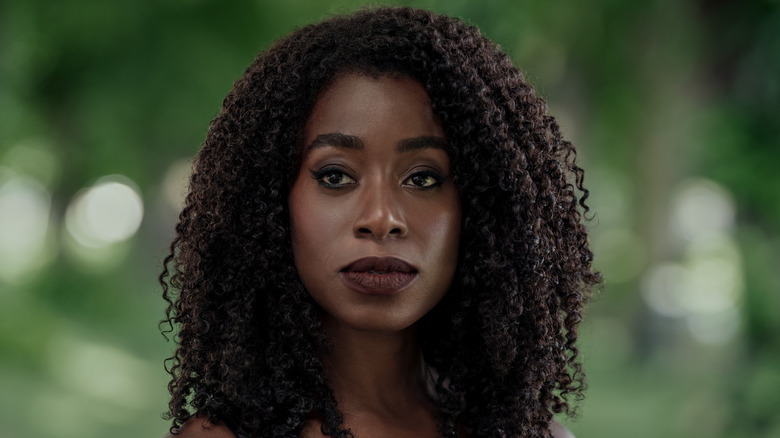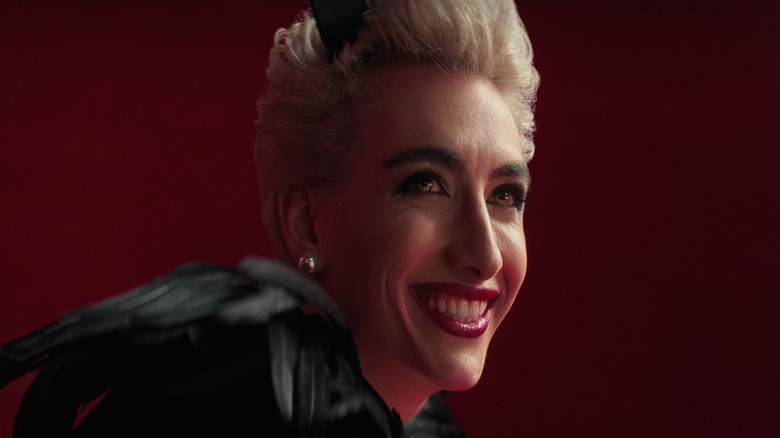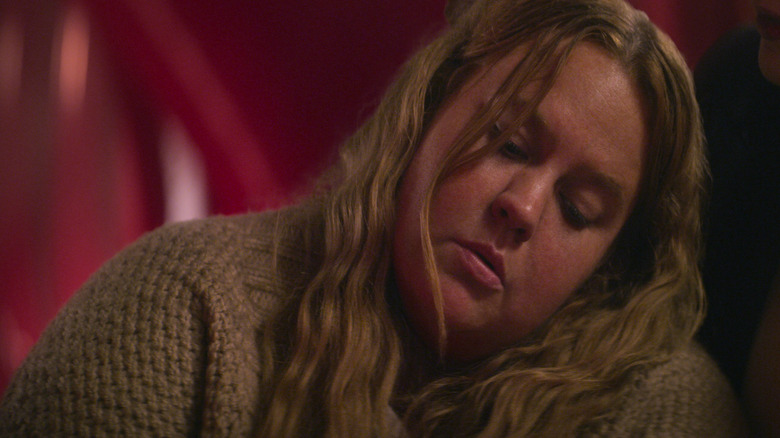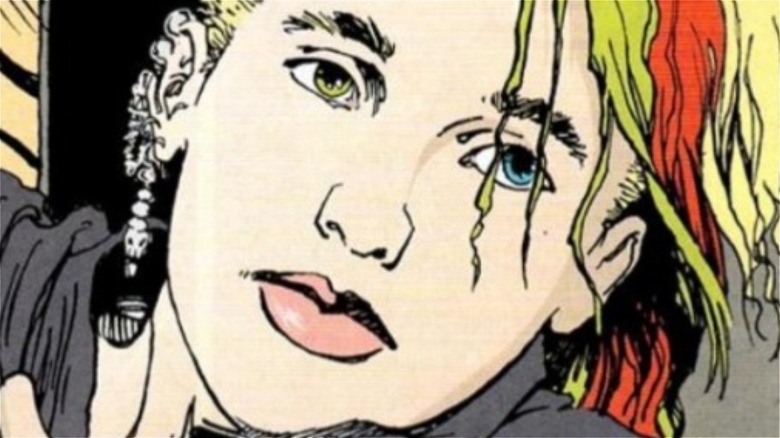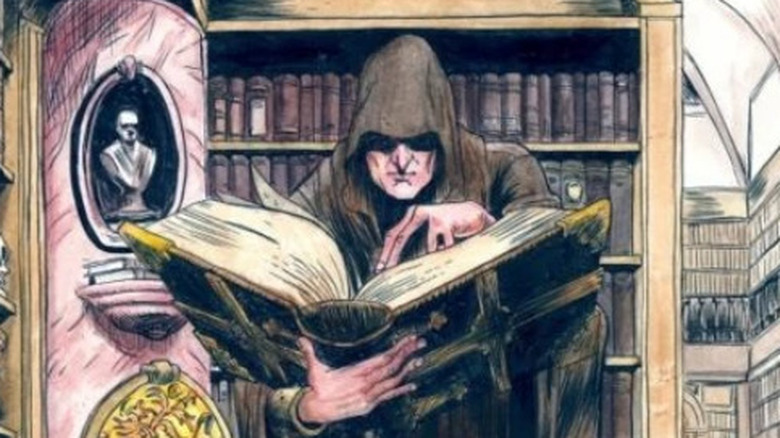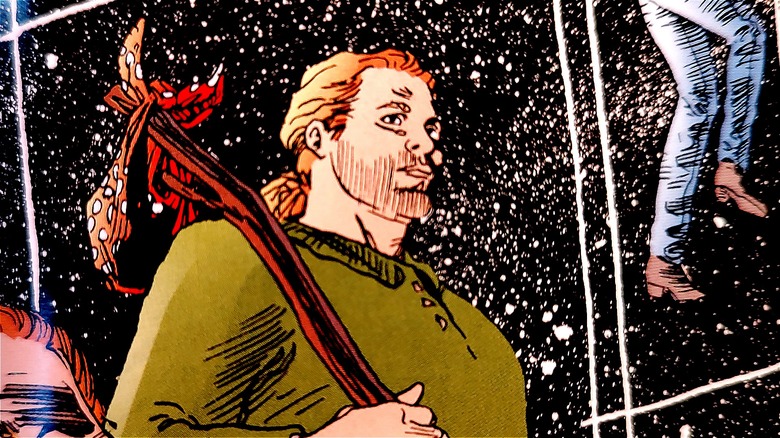What Are The Endless In Netflix's Sandman?
In Neil Gaiman's "The Sandman," all mortals are surveilled, guided, and guarded — although, admittedly, not too closely — by the Endless, seven powerful entities that embody core concepts of living nature. These include Dream, Death, Desire, Despair, Delirium, Destiny, and Destruction, each named according to their eternal trade. While Dream, better known as Morpheus (Tom Sturridge), is the focus of Gaiman's story, all seven have rich lore to unpack.
With a few broad strokes, let's set the scene: The Endless are the children of Mother Night and Father Time, two cosmic entities that represent nothing and everything, respectively. In this way, they were born into sovereignty, forever tasked with ownership of a force that they are technically a physical manifestation of. In short, Dream rules over The Dreaming, but Dream is also part of The Dreaming. Building on that, should one of the Endless be harmed, their aspect of life will be harmed, too. But, should one of the Endless be killed (which isn't very Endless of them, to be honest), their aspect of life will outlive them and create a variant to rule in their stead.
Basically, the Endless are gods (although they specifically reject this comparison) and follow similar mythological structures to that of the Greek pantheon. With that all in mind, let's take a brief look at each of the seven Endless, who they are, and what they do.
Dream of the Endless
Dream of the Endless goes by many names, but the most notable ones are Morpheus, the Sandman, or simply Dream. As Morpheus is the star of Gaiman's story, Sandman fans — whether they be readers of the comic, listeners of the Audible drama, or viewers of the Netflix series — have ample time to see everything he is capable of, so this entry specifically might feel more condensed than others.
Dream of the Endless is the sovereign of The Dreaming, a realm where all dreams take place. Yes — every dream, even the embarrassing ones. His merit is frequently miscalculated as many find it difficult to appreciate the importance of dreaming. Dreams are more than silly fantasies that play like distorted films in our sleeping minds. Dreams allow mortals (read: not just humans) to interface with their ambitions and fears. Morpheus himself says it best, in one conversation with Lucifer Morningstar (Gwendoline Christie), when he explains, "You say that I have no power? Perhaps you speak truly. But you say that DREAMS have no power? Ask yourselves, all of you, what power would Hell have if those imprisoned here could not dream of Heaven? "
Yes, Heaven and Hell are real things in "The Sandman," because Gaiman has a dark fascination with all mythology. These two realms seem to operate in a separate vertical from the Endless, not in opposition to them, although the hordes of hell bear a particularly strong disdain for the Lord of Dreams. They, along with a number of Morpheus' siblings, consider him a snobby elitist. In fairness, they're not totally wrong: Morpheus is incredibly moody and approaches his role with a deep reverence that often manifests as petty pride. With the help of a patient sister, however, he does get better, proving that even the Endless are capable of change.
Death of the Endless
Death of the Endless (Kirby Howell-Baptiste) is quite possibly the most powerful entity amongst her seven siblings. As her name suggests, she is the sovereign of mortality, and it's her sworn duty to ensure that every soul is properly escorted to and from the beyond in accordance with their fated time. Death alone of the Endless possesses deep magic, which she sometimes uses to reshape existence in ways that please her. In summary, she is the one true reaper to whom all death gods must bow.
Like Dream, she has her own realm, although it's never given an explicit name. It is, however, sometimes referred to in passing as "the Light at the End of the Tunnel." Despite this, her realm is neither Heaven nor Hell, both of which exist on their own unique merits.
Death is greatly feared by mortal kind, who almost universally perceive her as an inevitable cruelty that all must suffer, and to her credit, she understands their mistrust. From a mortal context, she is the ultimate thief, a merciless, destructive force. And yet, even knowing this, Death is kind — kinder than any of her siblings, actually. It is with compassion and grace that she approaches every soul, ensuring that, in the their time of transition, she is the sort of guide that would make such a difficult moment a little less hard. She keeps herself in check by spending one day, every century, as a mortal woman, and sharing those few precious hours with as many lives as she can.
Another important facet to her character: Death knows that it will one day be her role, once the last living soul has passed, to put the universe to rest — at which point, her work will be complete.
Desire of the Endless
Desire of the Endless (Mason Alexander Park) is one of the youngest siblings, and the older twin of Despair. Desire can appear as any gender or sexuality, and they are the source of all yearning, which drives mortal kind to action. In their own words, "Where I touch, things want and need and love — drawn to their objects of desire like butterflies to a candle flame." They are unrepentantly vain, a fact best represented by their realm. Entitled The Threshold, Desire's realm is literally a giant flesh and blood statue of themselves in which the heart is their penthouse suite. Extravagance aside, the visual is undeniably striking.
Desire is also incredibly cruel and enjoys toying with mortal kind, something that their older siblings frown upon — specifically, Death and Dream. This reaction only fuels their games, because Desire loathes Dream, so much so that they will go out of their way to cause him every inconvenience and harm imaginable. At their worst, Desire combines their meddling games and hatred for Dream together, the results of which are horrific for mortals. One such instance saw them sexually assault a comatose woman, Unity Kincaid (Sandra James-Young) in an effort to create a hybrid being that could potentially bring about Dream's death.
At this point, it should be understood that the Endless are not inherently good. They do not necessarily follow the same code of morality that the best of humanity strives toward. Death holds herself accountable, even Dream, too (sometimes), but it is by no means the rule of thumb.
If you or anyone you know has been a victim of sexual assault, help is available. Visit the Rape, Abuse & Incest National Network website or contact RAINN's National Helpline at 1-800-656-HOPE (4673).
Despair of the Endless
Despair of the Endless (Donna Preston) is one of the youngest siblings, and the younger twin of Desire. Without her force, mortal kind cannot appreciate the fleeting power of joy, nor the vital role that sorrow plays in shaping the value of any given thing. As she once said, "Take away the despair and there's nothing left."
Her realm, although never named, is a gray, foggy world littered with mirrors in which Despair can reflect upon the misery experienced by the living. Also, it's full of rats, just in case the aesthetic wasn't depressing enough already. Interestingly, Despair is on her second aspect of existence. Her first aspect was chipper, confident, and thoughtful, while her current aspect is the embodiment of every negative stereotype associated with a depressed woman. It is never specified who killed her first aspect, but Dream briefly mentions harboring a deep malice towards the guilty party.
Like Desire, Despair sometimes finds sport in toying with mortals. That being said, she does so less frequently, as her current aspect prefers to passively observe. When she does feel the need to meddle, Despair tends to work closely with her twin, as well as the youngest of the Endless, Delirium (more on her next). Much like Desire, Despair seems to dislike Dream, although maybe not as violently ... which, in the context of the Endless, is a dangerously relative term.
Delirium of the Endless, formerly known as Delight
Delirium of the Endless is the youngest of the seven and the only one to have been known by two unique names. Originally, she was Delight, the physical manifestation of mortal pleasure, but now her nature is more decidedly manic. No explanation is ever given as to why she made the shift, only that the shift was made due to, presumably, some sort of trauma. It's not even clear if it was by her own choosing, or by another's. For this reason, and for her comparative youth, the other Endless are more protective of her. Fittingly, literal Madness is her realm, and it's so nearly impossible to comprehend that only Delirium herself can properly navigate its topography. Dream traverses it during one story, and even he only barely makes it out.
Delirium struggles with clear thought and speech. In the comics, this is represented by a scrawling font and various colors for her speech and thought bubbles, meant to match her current — and constantly shifting — mood. Since Delirium does not appear in Season 1 of the Netflix series, it remains to be seen how her unique dialogue will be represented on-screen.
It's important to note that Delirium is capable of focused, precise communication, but she finds it tremendously painful to sustain this. Meanwhile, like her mood and mental focus, Delirium's physical appearance shifts wildly from moment to moment. The shifts can be subtle, like a change in eye color, or impossible to ignore, like a full-body transformation. That being said, she usually appears as a small teenager. No matter what form she takes, though, her shadow never matches it and, even more terrifyingly, it has physical mass. Trust us ... leave it alone.
Destiny of the Endless
Destiny of the Endless is the oldest among his siblings. The living embodiment of purpose, Destiny appears as an blind, elderly man, chained at the wrist to a tome entitled the Book of Souls. The Book of Souls contains the story of everything, and through it Destiny knows the fate of every living thing. Because of his propensity for omniscience, he often presides over any given meeting that the Endless have. Who better, than one who already knows what to do? His realm is known only as his Garden, a mighty hedge maze that can be reached through all mazes. It's unclear if anyone has attempted to reach his realm via the back of a cereal box, but if he really means all mazes when he says all mazes, it's probably possible, right?
For the most part, Destiny keeps to himself, preferring to observe events rather than participate, which is almost definitely why Jeffrey Wright was cast for the Audible production. Interestingly, despite the Book of Souls permitting him to always know the course of every life story, it's possible for Destiny to be surprised. For instance, he has no idea as to why Delight became Delirium. Also, the Kindly Ones (Souad Faress, Nina Wadia, and Dinita Gohil), also known as the Three Who Are One, blindsided Destiny by demanding that he trigger a series of events that would ultimately end in Dream's death. If anyone knows the story better than Destiny, though, it would be the Fates.
Destiny does not appear in Season 1 of the Netflix series, so it remains to be seen how he will be portrayed in future seasons.
Destruction of the Endless
Destruction of the Endless is the physical manifestation of existence's greatest force for change ... and he hates it.
In sharp contrast to what you might expect, Destruction is a kind and gregarious person, beloved by all whom meet him. However, long before the narrative of "The Sandman" begins, Destruction discovers that humanity's future will involve weapons and death beyond whatever lay in the past (read: the atomic bomb) and so he makes the unprecedented choice to walk away from his role, his duties, and his realm, to instead live as an immortal hermit. Because he isn't dead, a new aspect of Destruction never replaces him, thus his realm remains empty — and intriguingly, the force he was created to oversee continues on.
Aside from Death, Destruction is easily the warmest of the Endless, and it's for much the same ironic reasons. Loathing how his aspect of life is often perceived and abused, he goes out of his way to subvert expectations. He wiles away his eternity by creating art — paintings, statues anything he can get his hands on. He's ... well, not very good at it, but that was never the point. In his own words, "You get life, and breath, a world to walk and a path through the world — and the free will to wander the world as you choose."
Perhaps obviously, his relationship with the other Endless is strained by his departure. Delirium, especially, is hurt, as she is deeply fond of her older brother. As far as the comics go, Destruction is the last of the Endless to appear on-panel, so it might be another few seasons before he joins the Netflix series.
